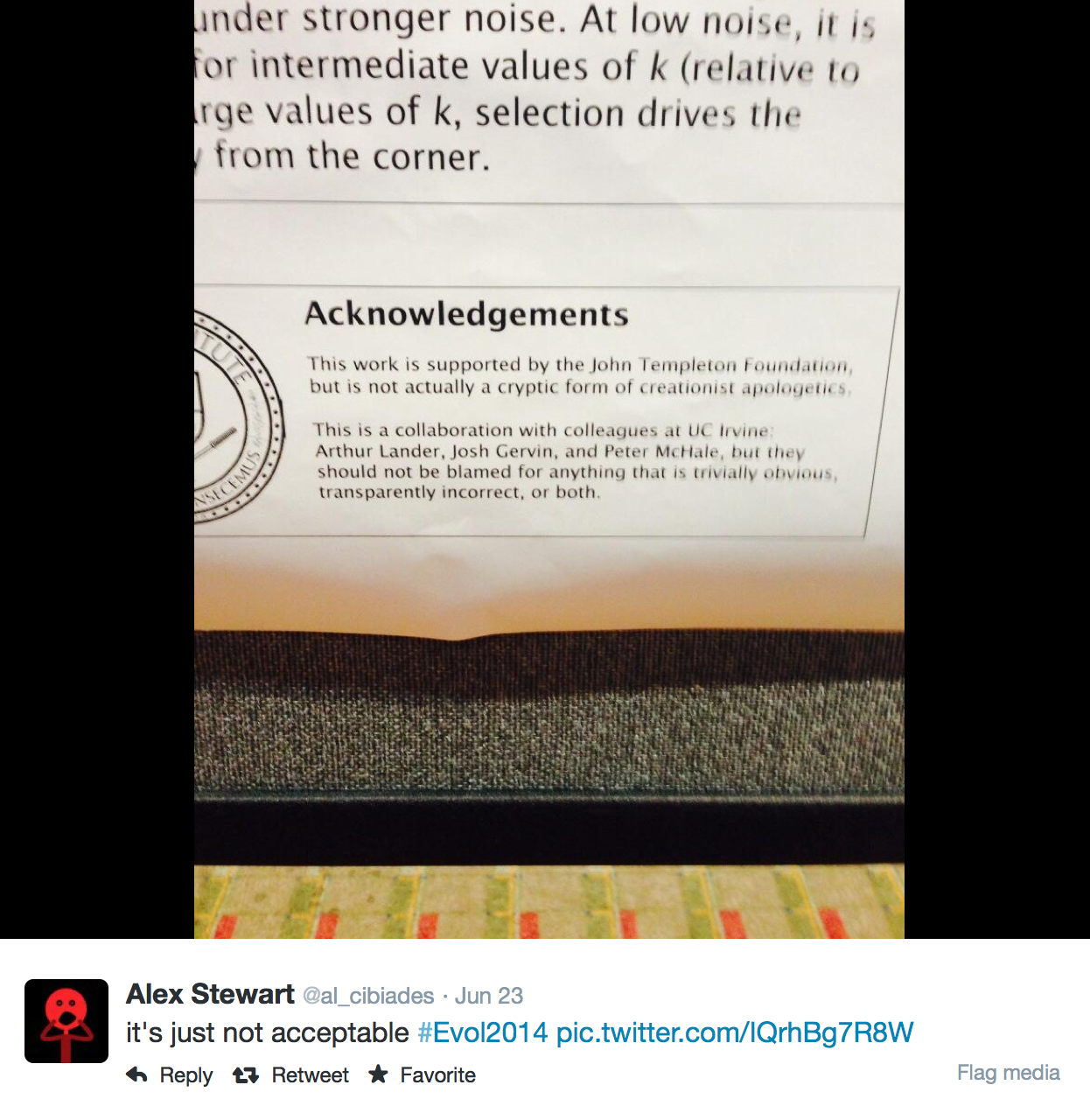If you listen to the mewling of elite scientists and the hand-wringing of the conservative media, academic freedom is once again under attack by the gangs of social-media-wielding PC conformity enforcers. This week’s victim is Nobel laureate Tim Hunt, following his comments about the dangers of mixed-sex scientific laboratories.
If you haven’t been following this story, here’s a brief timeline of events to catch you up:
- 1943: Richard Timothy Hunt is born in the small town of Neston, located in Cheshire, England.
- 1982: Hunt discovers the first cyclin molecule while studying the cell cycle of sea urchins
- 2001: Hunt shares the Nobel Prize in Physiology or Medicine with Paul Nurse and Leland Hartwell for discovering the molecular mechanisms that control progression of the cell cycle (e.g., cyclins).
- 2015: Hunt attends the World Conference of Science Journalists is Seoul, South Korea.
- June 9: Hunt gives a speech to a lunch for female scientists and journalists, during which he says, “Let me tell you about my trouble with girls. Three things happen when they are in the lab. You fall in love with them, they fall in love with you, and when you criticize them, they cry”.
- June 10: Hunt resigns from his position at University College London
- June 13: Hunt said in an interview with the Guardian that he had been forced out without having an opportunity to defend himself or present his side
- June 15: UCL issued a dubious statement, citing Hunt’s “personal decision to offer his resignation” and claiming that the media response had no influence on their decision to accept it
Since then, a number of prominent scientists have gone to the press to criticize UCL’s firing of Hunt (e.g., here, here, and here, all paywalled). The defenses of Hunt involve the typical overwrought rhetoric. For example, Andre Geim claimed that Hunt had been “crucified”, while Richard Dawkins referred to “the baying witch-hunt that it unleashed among our academic thought police”. (Aside to Dawkins: it is tacky to refer to a backlash against sexism as a witch hunt, for much the same reason that it is tacky to refer to a backlash against racism as a lynch mob.) But behind the rhetoric, there are basically two complaints. One, that UCL’s firing of Hunt was a disproportionate response, given the nature of the transgression, and two, that the response would have a “chilling effect” on academic speech.
I actually agree with the first point. It strikes me that a more appropriate response would be some combination of public shaming and sensitivity training. According to many of the people who have come forward to support Hunt, he is an intelligent, kind-hearted person. If that is true, then someone needs to make sure he understands how comments like this — even made as jokes — contribute to a culture of sexism, doing real, if indirect, harm to scientists and to science. (And if it’s true, he should be invested in learning this lesson.)
On the other hand, maybe this is just the most recent incident in a longstanding pattern of sexist behavior. If so, Hunt should absolutely be fired, as should every administrator who ignored that behavior up until June 9.
I suspect the truth is somewhere in the middle. Hunt jokingly refers to himself as a chauvinist, and many of the defenses have accused people of “not getting” his sense of humor. That suggests that he has probably been making mildly sexist, mildly harmful comments for decades, and the he has probably been approached about it many times in the past. In the manner of successful people of a certain age, he may have blithely disregarded that criticism, implicitly assuming that there was absolutely nothing he needed to change about his own behavior. If that’s right, maybe this will serve as a wake-up call — unless he gets seduced by the appeal of wallowing in his own victimhood.
No matter what the actual story is, though, UCL’s response was terrible, and would be galling if it were not so depressingly familiar. The fact is, this is the sort of scapegoating that institutions — including universities — do all the time. Despite UCL’s disingenuous protestations to the contrary, it seems clear that Hunt was fired not for sexist beliefs or behaviors or comments, but for embarrassing UCL. By firing Hunt, UCL is able to make a big show of standing up for equality, while avoiding doing the much harder work of addressing systematic sexism in science.
The formula is this:
- Let systematic unfairness persist, because addressing it involves effort and risks alienating powerful people who currently benefit from that unfairness
- If anything goes wrong, deny that there is a problem and cover things up
- If media attention makes strategy unsustainable, blame the individual, distancing your institution from them and disparaging them however possible
- Claim that the problem was “a few bad apples”, and now the institution is 100% cured
- Repeat
It’s the same formula for sexual harassment and scientific misconduct in universities, for insider trading and market manipulation in financial firms, and for fabrication of evidence and murder of civilians in police departments. The only somewhat surprising thing here was the speed with which UCL skipped from stage 1 to stage 3.
What is Academic Free Speech?
The issue of free expression is more complicated. As everyone should know by now, freedom of speech does not mean freedom from consequences. The fact that you have a right to say something does not mean that you have a right not to be criticized. And, even in the US, where free speech has explicit constitutional protection, you can be lose your job if you say something that causes embarrassment for your employer.
But for freedom of academic expression to be meaningful, it has to be subject to a higher level of protection. As an academic, your job is to seek truth and to share it. Your job must be protected if, in the course of your truth seeking, you say something that is embarrassing or distasteful to your department or university. Without that protection, any claims of academic freedom are hollow. And it does not matter if we are talking about tenured professorships, or honorary appointments, like Hunt’s position at UCL. While these distinctions may affect the legality of firing someone for something they say, it doesn’t change the ethical considerations.
The question then becomes, What is academic speech? Is it any statement made by an academic? Any public statement? It can not be either of these, because then we would be providing protections not to a particular class of speech, but to a particular class of people — people who, by the way, already occupy a position of relative privilege. Instead, we need to limit these protections to speech that is intended as a contribution to academic discourse.
Were Tim Hunt’s comments academic speech, then? It depends. If, as some have suggested, these comments were “just a joke”, then no. A joke that you make at a scientific conference is just regular speech. If you make an offensive joke at a conference, and you are punished for it, your academic speech has not been curtailed. If he was not being serious, then UCL does not owe him any special consideration.
On the other hand, we can interpret the comments as an articulation of the potential negative consequences of male-female dynamics in a laboratory setting. How the composition of a lab group affects the process and progress of science is certainly a legitimate subject of academic inquiry. We could say that Hunt has put forward the following hypothesis: Due to the complications that arise from romantic feelings, as well as systematic differences in the ways that men and women communicate, mixed-sex laboratories are less desirable than single-sex laboratories.
If we say no, you are not allowed to discuss or investigate that hypothesis, because challenges an inviolable assumption that men and women are equal, or even interchangeable, we would absolutely be constraining academic freedom. If we care about academic inquiry, we have to stand together and defend the right of Tim Hunt — or anyone else — to ask questions like this.
But . . .
If we agree to treat and defend Hunt’s statements as a form of academic speech, we also have to evaluate it as academic speech. The problem is, as academic speech, it is appalling — not because of its conclusions, but because of its profound lack of adherence to the most basic scholarly standards. This is a vague interpretation of anecdotal evidence, presented and interpreted in a vacuum that ignores any cultural context or consequences. Worse, from a purely academic perspective, it completely ignores any and all prior scholarship on the topic. If I got this in an undergraduate paper, I would probably give it a C+ — in the context of contemporary grade inflation.
To claim that mixed-sex labs are bad because you have had unpleasant (and perhaps inappropriate) interactions with women is not intellectually very different from claiming that global warming is not real because you were cold last winter.
It is 100% legitimate to ask about the consequences of having men and women working together in the same laboratory. But if you are going to ask about that, here are at least a few of the things you need to consider before you open your mouth.
- What does the empirical data say about scientific productivity, or career success, as a function of the composition of males and females in a laboratory?
- If we accept the assertion that women cry more. . . Is crying necessarily a bad thing? Is it because they respond more emotionally than men do to the same criticism, or is it because they receive harsher criticism? If women cry when you criticize them, why do you seem to assume that the women have a responsibility to toughen up, and not that you have a responsibility to be less abrasive?
- Given that getting a good postdoc or faculty position depends substantially on connections and letters of recommendation, wouldn’t segregation perpetuate any historical inequalities?
- If we accept the idea that men and women think and behave in systematically different ways . . . Does the benefit of avoiding the occasional uncomfortable situation outweigh the benefits of having a more diverse set of brains thinking about scientific questions?
- How does your analysis change when you consider the fact that not all scientists are heterosexual?
I’m sure there are plenty more considerations. This isn’t my field, so I don’t really know what they all are. The point is, it’s not Tim Hunt’s field either. That does not mean that he could not make a legitimate contribution. After all, he seems to be a very intelligent person, and he has decades of personal experience in the laboratory setting. But if he legitimately wants to contribute to this discussion, he has a responsibility to think deeply about it, and to grapple with the decades of work by other very intelligent people who have thought deeply about it. If he is having trouble, a little time on Google Scholar or a stroll over to one of the many Sociology departments in London would set him on the right track.
I’ve never met Tim Hunt. I’ve met a few of the people who have defended him, but I don’t know any of them well. So, I’m not in a good position to judge what he is like as a person. However, the picture seems to be of a smart, decent human being who has done a lot of good. It would be a damn shame if the outcome of this was that he was excluded from science. It would also be a damn shame if the take-home lesson from this was that academic freedom is only safe if treat the ill-considered opinions of senior academics with a sort of breathless reverence.

